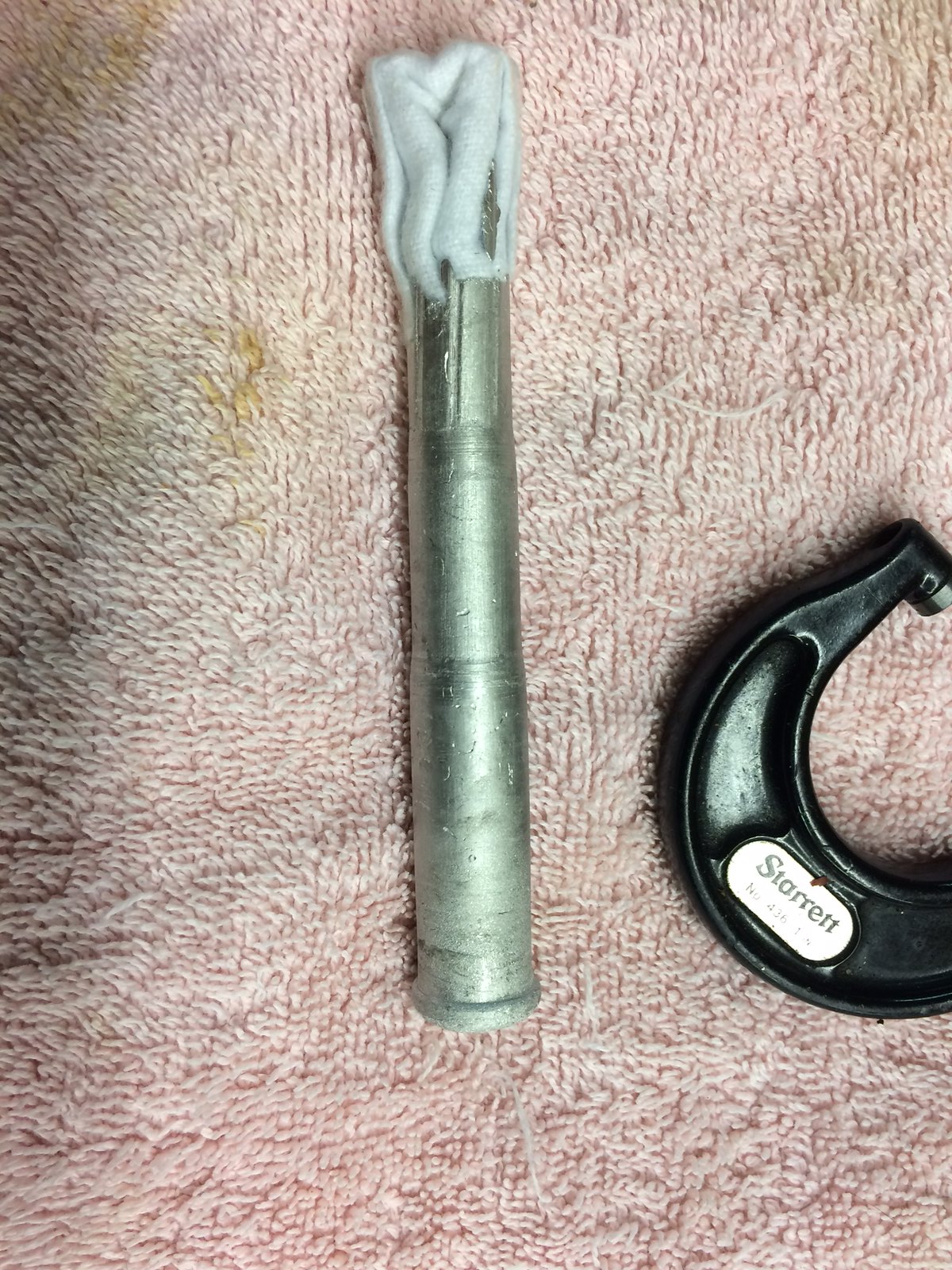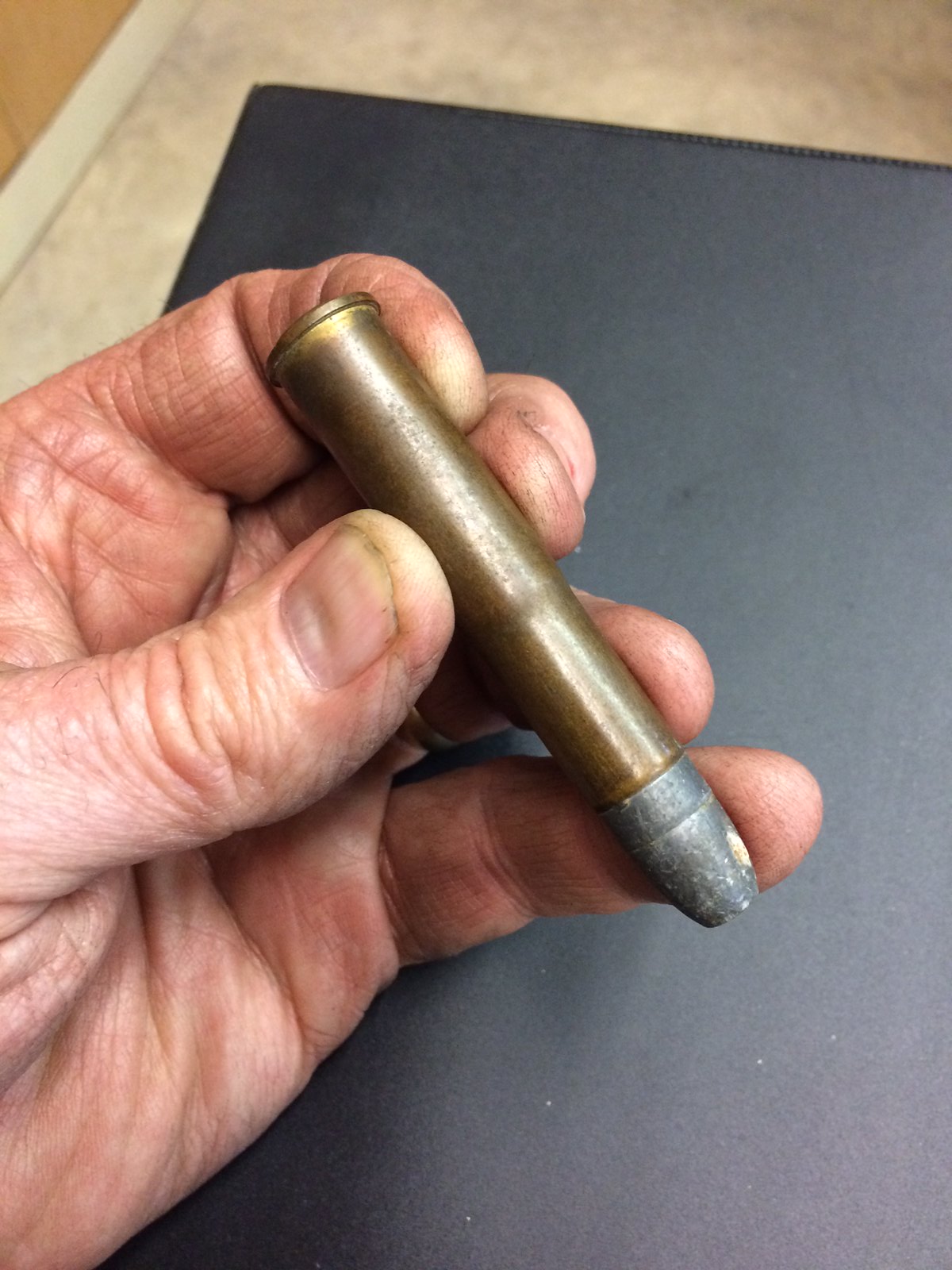

 The Accurate Reloading Forums
The Accurate Reloading Forums  THE ACCURATE RELOADING.COM FORUMS
THE ACCURATE RELOADING.COM FORUMS  Guns, Politics, Gunsmithing & Reloading
Guns, Politics, Gunsmithing & Reloading  Gunsmithing
Gunsmithing  Drilling
DrillingGo  | New  | Find  | Notify  | Tools  | Reply  |  |
| one of us |
I took in a drilling last week that has exposed hammers and two 16 gauge barrels over an unknown rifle barrel. The bore size of the rifle appears to be .45 caliber. It is a rimmed case, but I have not yet cast the chamber. I'm just curious: Were .45 caliber barrels commonplace on German drillings? This one has no signature or indication of a maker. The 16 gauge barrels have short chambers (2 1/2 inch). Bill Jacobs NRA Endowment Member US Army Veteran CWP Holder Gunsmith | ||
|
| One of Us |
.45 is not common. I would be a bit surprised if it was actually .45. Have you had it apart? Post a picture of the gauge markings (assuming it is post 1893) Always slug the bore. Sometimes it can be a bit surprising, even if you KNOW the caliber. Example, I have a 9.5x57 that slugs 9.4 (.370) Nathaniel Myers Myers Arms LLC nathaniel@myersarms.com www.myersarms.com Follow us on Instagram and YouTube I buy Mauser actions, parts, micrometers, tools, calipers, etc. Specifically looking for pre-WWII Mauser tools. | |||
|
| one of us |
A 0.421 pin gauge is a slip fit into the bore. There are 8 very narrow lands with correspondingly wide grooves. That gives me about 10.7 mm for a bore and maybe 10.9 mm for the groove diameter without slugging the barrel. I don't have any slugs that big in the shop without pulling the bullet on a .44 magnum! NRA Endowment Member US Army Veteran CWP Holder Gunsmith | |||
|
| One of Us |
Above my pay grade and knowledge. Are there any markings on the barrels? I would take good detailed pictures and post them over on the German Gun Collectors Association forum. Or send them to me and I will post them up or send them to a member or two. Lots of incredibly knowledgeable folks over there. Nathaniel Myers Myers Arms LLC nathaniel@myersarms.com www.myersarms.com Follow us on Instagram and YouTube I buy Mauser actions, parts, micrometers, tools, calipers, etc. Specifically looking for pre-WWII Mauser tools. | |||
|
| one of us |
"Cartridges of the World" lists a European round named the 10.75x65R Collath. Straight 2.75" case. Bullet diameter .424. Rim .542. | |||
|
| One of Us |
11mm Mauser or 43 Mauser is common. Likely it is that. Give us all the markings on the barrel, under the breech end. | |||
|
| one of us |
A chamber cast is pretty easy on a break open gun and can be done with candle wax if you don't want to get real Cerrosafe casting material. I agree with Tom that .43 Mauser (11,15x60R Mauser) is a prime candidate (the original 1871 version ran very close to .45 caliber), but there were literally scores of German cartridges of different lengths and configurations that are possibilities. The only real way to be sure is with a chamber cast and a slug of the bore. The GGCA is a really good bet too; I used to be their cartridge ID and proof mark guy several years ago. Still need that cast though. | |||
|
| one of us |
Looks like a 1 3/4 inch straight-walled case with the rim cutout being about 0.589 inches. My Cerrosafe has taken missing, so I'm ordering more today. NRA Endowment Member US Army Veteran CWP Holder Gunsmith | |||
|
| one of us |
Also, no proofs on the bottom of the barrels. There is an apparent serial number that matches the number on the frame. The number "673" appears on the lump. An "S" and "871" appear on the rifle barrel. Nothing else that I can see. Bill Jacobs NRA Endowment Member US Army Veteran CWP Holder Gunsmith | |||
|
| One of Us |
Ok, then the 43 Mauser is out; there is also a short version called the 10.5x47. And yes, there are lots of obscure ones like that. In the BP days, there were more forty-ish calibers made than all others. You will just have to make a cast and then make brass as close to that as you can. | |||
|
| one of us |
So, we're looking for a straight wall cartridge (or nearly so, some with slight shoulders look like straight chambers) with a 15mm (.590") rim diameter and a land-to-land bore diameter of about .421" (10,69mm) which implies a groove diameter of around .430" (10,9mm) or so. Since there are no other proof marks, that means this Drilling was built before 1891, which in turn means the cartridge must have originated in the 1870s or 80s. The .43 Mauser was by far the most common case used as a basis for German rounds of that era, and its rim and base diameters were 15mm/13mm, and that matches up with your rim measurement. If the breech end of the chamber, not the rim recess, is 13mm (.512") or a bit over it will be great news because brass will be pretty easy to make. The length you measured of 1-3/4" would mean that the cartridge is somewhere between 42mm and 46mm or so. There are several candidates shown in Dixon's "European Sporting Cartridges" that would fit those criteria. We may never be able to say which one the maker intended with any certainty, but the good news is that you should be able to make ammo for it with not too much problem, especially if it will take bullets in the .427-.432" range. I guess this is just a pretty long winded confirmation of what Tom said... | |||
|
| one of us |
 DrillingChamber by William Jacobs, on Flickr DrillingChamber by William Jacobs, on FlickrI got some Cerrosafe in and then, true to form, found where I hid the old stuff in my melting pot Anyway, the chamber dimensions are as follows...... Across lands: 0.438 Neck diameter: 0.471 Base diameter: 0.513 Case length above the rim: 2.231 Neck length: 0.755 Case has a very slight bottleneck and there is a slight taper to each section. Bill Jacobs NRA Endowment Member US Army Veteran CWP Holder Gunsmith | |||
|
| one of us |
| |||
|
| One of Us |
There were at least 20 historic 10/11mm European cartridges from the BP era, but yours looks like a 43/11MM Mauser. The most common one because it was the German military round for the 71 and 71/84 rifles; Borrow or buy a piece of brass. | |||
|
| one of us |
Thanks to all for inputs. This is a customer gun, and I will recommend that he not attempt to fire it. The shotgun barrels are Damascus, and, as has already been pointed out, the gun was likely made before 1900. It was apparently given to a grandfather who was part of the occupying force in Germany immediately after WWII. The story is that a grateful family gave it to him for kindnesses during that time. NRA Endowment Member US Army Veteran CWP Holder Gunsmith | |||
|
| One of Us |
dpcd- Man, you are a world of knowledge and I appreciate every time I read your posts! The only easy day is yesterday! | |||
|
| One of Us |
Ha, I make up most of what I say. Thanks. For that nice old drilling; I would not hesitate to fire it with black powder and lead bullets. Shotgun shells need to be low pressure as well. But just having it and admiring the workmanship of the 19th century is good too. | |||
|
| one of us |
Guess what I found.......... I rebarreled a Dutch Mannlicher today, and I was looking for a 6.5x54 rimmed cartridge in my box of forgotten and obsolete rounds. I saw this beast with the headstamp "Dominion 43M". It drops right into the chamber of the Drilling! I'm still not going to fire it, but I am going to give it to the owner so he can show it off. Bill Jacobs  43M by William Jacobs, on Flickr 43M by William Jacobs, on FlickrNRA Endowment Member US Army Veteran CWP Holder Gunsmith | |||
|
| Powered by Social Strata |
| Please Wait. Your request is being processed... |
|

Visit our on-line store for AR Memorabilia

